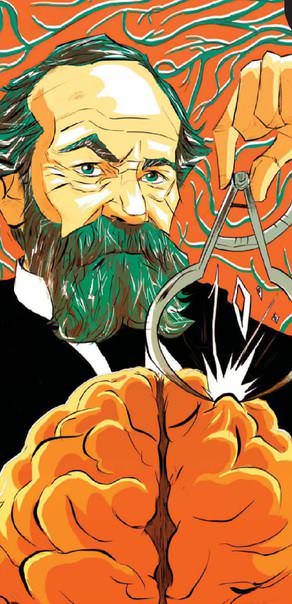يحاول ذهب - حر
10 Brain Myths Busted
November 2015
|Popular Science
It's going to take more than 10 percent of your brain to read this story.

In the Hollywood action-film Lucy, actor Morgan Freeman—playing a world-renowned neurologist— speaks to a packed auditorium. “It’s estimated most human beings only use 10 percent of their brains’ capacity,” he says. “Imagine if we could access 100 percent.” You may have heard that claim before. Unfortunately, it’s just not true. And after watching Lucy, Ramina Adam and Jason Chan, two neuroscience graduate students at Western University in Ontario, decided to set the record straight. “We realized we had to do something about all this misinformation,” Adam says. They set out to collect common misperceptions about how the brain works, and we lent a hand in debunking them.
1. We use only a fraction of our brains.
In 1907, famed psychologist William James claimed, “We are making use of only a small part of our possible mental and physical resources.” A journalist later misquoted him as saying the average person develops only 10 percent of his mental capacity. Scans, however, show that we use every part of our brain, though not all regions are active at once. (Sorry, Morgan.) That’s why damage to any area of the brain—such as the aftermath of a stroke—usually results in mental and behavioral effects.

2. Playing classical music to infants makes them smarter.
هذه القصة من طبعة November 2015 من Popular Science.
اشترك في Magzter GOLD للوصول إلى آلاف القصص المتميزة المنسقة، وأكثر من 9000 مجلة وصحيفة.
هل أنت مشترك بالفعل؟ تسجيل الدخول
المزيد من القصص من Popular Science
Popular Science
They Might Be Giants
A photographer-and-ecologist team are on a mission to document the forests’ mightiest members.
3 mins
Winter 2020
Popular Science
Droplet Stoppers
Covid-19 made face masks a crucial part of every outfit, and we’re likely to don them in the future when we feel ill. Fortunately, there’s a style for every need.
1 min
Winter 2020
Popular Science
Landing a Lifeline
For those whose livelihood depends on the ocean, a covid-spurred interruption in the seafood market might speed progress toward a more sustainable future—for them and for fish.
12 mins
Winter 2020

Popular Science
Headtrip – Your brain on video chat
Dating, Catching up with family, and going to happy hour are best in person.
1 min
Winter 2020

Popular Science
Behind The Cover
Butterflies may seem delicate, but they are surprisingly tough.
1 min
Winter 2020

Popular Science
Tales From the Field – A cold one on mars
Kellie Gerardi, bioastronautics researcher at the International Institute for Austronautical Science
1 min
Winter 2020
Popular Science
The Needs Of The Few
Designing with the marginalized in mind can improve all of out lives.
6 mins
Winter 2020
Popular Science
Life On The Line
On the Western edge of Borneo, a novel conservation-minded health-care model could provide the world with a blueprint to stop next pandemic before it starts.
14 mins
Winter 2020

Popular Science
waste watchers
YOU CAN TURN FOOD SCRAPS INTO FERTILIZER IN ALMOST ANY CONTAINER. THESE BINS USE THEIR OWN METHODS TO ENCOURAGE THE PROCESS, BUT BOTH KEEP BUGS AND STINK AT BAY.
1 min
Winter 2020

Popular Science
why can't i forget how to ride a bike?
LEARNING TO PEDAL IS NO EASY FEAT.
1 min
Winter 2020
Translate
Change font size
